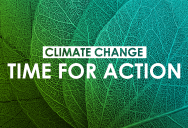
S&Ds criticise the two-face approach of EU member states on emissions and climate change
Date
Tue, 04/17/2018
Sections
Climate & Environment
Socialists and Democrats are strongly committed to delivering on the promises made in Paris at the COP 21 UN summit on climate change. The S&D Group is pushing for ambitious binding targets on greenhouse gas emissions reductions, as well as for more precise mechanisms for monitoring and reporting emissions. However, when it comes to the Effort Sharing Regulation the EU Council was not willing to come close to the Parliament's ambitious position that was negotiated by S&Ds and other progressive groups.
Today the European Parliament voted on two important regulations, as already agreed with the EU Council.
The S&D Group could not back the agreement on the Effort Sharing Regulation (ESR), because it falls short of what’s needed. The ESR covers 60% of the EU’s greenhouse gas emissions - including transport, buildings, agriculture and waste. The trajectory for reducing emissions by 30% by 2030 in the sectors not covered by the EU Emissions Trading System (ETS) is not realistic enough to comply with the goal of keeping the temperature rise ‘well below 2°C above pre-industrial levels,’ as demanded by the UN.
The second regulation will incorporate greenhouse gas emissions and removals from land use, land use change and forestry (LULUCF) in the 2030 climate and energy framework*. This regulation was backed by the S&Ds as the final outcome covered the minimum standards demanded by our group during the negotiations.
Paul Brannen MEP, who is responsible for LULUCF in the S&D Group, said:
“We as a group delivered on our red lines: The reference period is clearly set in the past and wetlands, including peatlands, are recognised as being of key importance.
“We also managed to incentivise the use of long lasting wood products such as engineered timber in construction. This LULUCF legislation means that how we use land is being acknowledged as of key importance in the tackling climate change.”
S&D spokesperson on environment and negotiator of the Effort Sharing Regulation, Miriam Dalli MEP, said:
“The EU missed the opportunity to seize global leadership.
“The lack of commitment by member states to really comply with the commitments we collectively took in Paris is hugely disappointing. The member states have given themselves too much flexibility, which might mean they will miss the targets that we need to reach.
“In Paris, we all agreed to do our best to limit the temperature increase to 1.5°C above pre-industrial levels. But we did not see any true leadership from the member states to live up to their responsibility despite all the scientific evidence of the phenomena we will experience if we fail to reach the targets set.”
* Note to the editors
LULUCF is a category within the United Nations Framework Convention on Climate Change (UNFCCC) accounting framework for GHG emissions. Both emissions (e.g. from deforestation or agriculture) and removals (CO2 capture by vegetation and soils) are accounted for under this category. Currently, the EU and its member states have to account for the LULUCF sector under the Kyoto protocol, which places constraints on the EU and each of its member states to ensure that the LULUCF sector does not yield extra emissions. However, the Kyoto Protocol will expire at the end of 2020.

